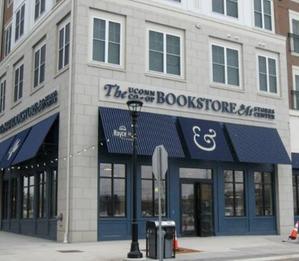Suzy Staubach was general books division manager for 34 years at the UConn Co-op, the independent member-owned bookstore serving the University of Connecticut. She was a founder and co-chair of the Connecticut Children's Book Fair, which attracts thousands of children and their adults and wrote a column, "Face Out: Notes of a College Bookseller," for College Store magazine for two and a half decades. In 2008, the Connecticut Center for the Book gave her a Lifetime Achievement Award for her service to the literary community of the state. Suzy now spends her time writing and potting. Here she discusses the trends in higher education that have led to the loss of many independent bookstores on college campuses.

|
|
| Suzy Staubach | |
Earlier this year, when the University of Connecticut chose to bring Barnes & Noble College to campus and sent the UConn Co-op, the 41-year-old member-owned, student governed independent bookstore packing, many people, including myself, were shocked and dismayed. Nationally, outside the academic arena, the cultural trend is towards supporting locally owned and independent businesses. Independent bookstores are on the rise. Farmers markets are wildly popular. Yet UConn, and other universities, especially public universities such as, most recently, the University of North Carolina at Chapel Hill and UC Irvine, are eschewing the local and opting for corporate relationships. Why is this happening?
Most public universities have been facing budget cuts in recent years. States no longer fund their institutions of higher education as they once did. This has led to hefty tuition increases and the courting of out-of-state and international students for whom tuition is higher than in-state students. At UConn, the out-of-state tuition for an undergraduate is three times the tuition charged for in-state. Some 21% of the students in Storrs are from outside Connecticut.
In addition to less state support, federal and other grants have decreased in recent years. These factors have led to cost-cutting measures, most significantly, relying proportionally more on adjuncts and teaching assistants and less on tenure or tenure track professors. A side effect of the national trend towards non-tenured faculty, which began in the mid-'70s in both private and public universities, is that power is concentrated within the administration.
Budget constraints have also led to outsourcing and exclusive deals with large corporations to make up for the shortfalls. Many schools no longer operate their own dining services, but outsource student meals to international food service corporations such as Chartwells and Compass. Dorms, especially at public universities, are being outsourced. The University of California Irvine, Arizona State University, the University of Tennessee and others have student housing operated by American Campus Communities. EdR Collegiate Housing built the apartments in Storrs Center at UConn, including those above the UConn Co-op.
Interestingly, the move to attract high-tuition out-of-state students and the competition for those students, together with the move to outsource student housing to large corporations bidding against each other, has led to increased (and expensive) amenities that were unheard of a few years ago. Exercise equipment, granite counters, high-speed Internet, flat screen televisions, yoga rooms and swimming pools have become standard.
Large and many small and medium size campuses are either Coke campuses or Pepsi campuses. UConn is a Coke campus--no Pepsi products allowed. California and Arkansas are Pepsi schools. These exclusive contracts, usually negotiated for spans of 10 years, can bring millions of dollars to the institutions. They are, in effect, mini-monopolies on campus. Student choice is eliminated. Once the contract is negotiated, competition is eliminated.
Similarly, large campuses, particularly those with strong athletic programs, enter into exclusive deals with one of the large athletic apparel manufacturers: Nike, Under Armour or Adidas. Arizona State is an Adidas school. Maryland is an Under Armour school. UConn is a Nike school. The apparel companies provide gear for all the varsity teams at no cost, enjoy advertising privileges at events, dominate sales or in some schools have the only products for sale, and often also give money. At UConn, Nike--at "no cost to UConn"--redesigned the school mascot into a fiercer looking Husky in hopes of building an audience for football. This meant increased sales for Nike, and license fees for UConn as the Co-op had to mark down items with the original Husky and bring in merchandise with the new dog.
These deals have become increasingly lucrative as college athletics has become big business. Schools with robust football programs (not UConn, whose football program loses $20 million a year) can realize tens of millions of dollars from the deals their conferences make with the media in addition to the dollars from the apparel companies.
The focus of college and university administrators has changed. An important part of their jobs has become negotiating with large corporations. Many college presidents and top administrators have become like CEOs themselves rather than scholarly leaders. Many have the paychecks and perks to match, necessitating bringing in even more money. At UConn, recent budget cuts forced layoffs across campus, most deeply at the library, while the number and salaries of administrators increased.
Textbook publishers benefit from e-books because, for the most part, students do not purchase them but purchase the right to access them for a semester. This eliminates used books, which have long been an important part of the mix in college bookstores as students like their lower prices. Publishers however, get no benefit from used books. And since e-coursebooks are time sensitive, if a student has to repeat a course, he or she must purchase the book again.
Meanwhile, the two leading bookstore lease operators, Barnes & Noble College and Follett, have been under pressure themselves, with intensifying competition from Amazon. Amazon has moved into the used textbook business, entered into deals with universities, and is opening on-campus and near-campus staffed pick-up sites. Barnes & Noble and Follett have long approached university administrators with deals, but in recent years, they have ramped up their activity on this front and become more aggressive. They offer a percentage of sales in their bids and make very high projections of what will be paid directly to the university (often for "scholarships" though it is never mentioned whether these scholarships are in place of already existing scholarships funded by the university and so of no net benefit to students). Independent college stores have a variety of arrangements with their universities, all of them contributing mightily both monetarily and non-monetarily, though admittedly not as flashy as promising "Three million a year!"
Add to all this, a waning respect for the humanities on many campuses, especially research universities. The humanities do not bring in the grants that the sciences do. They are not part of STEM. English departments are far less expensive to operate than many other departments; their faculty are generally paid less and they do not need labs or fancy equipment. However, neither do they bring in millions of dollars in grants.
So we see these forces at work: the decreased financial support of public institutions from their states; the increase of out-of-state students which weakens ties to in- state families/taxpayers; the reliance on deals with large national and international corporations for operating funds and for operations; the subsequent corporatization of universities themselves; and the lease operators' push to expand. None of these trends results in lower costs for students. In fact, the opposite: across the nation tuition is up, room and board is up, textbook prices are up (many titles are more expensive at the lease stores than the independents), apparel prices are up (UConn's athletic department lobbied for B&N and objected to the Co-op's student friendly pricing for clothing!), and as we all know, student debt is up.
It is in this climate that the University of North Carolina, despite widespread objections and protests, decided to turn to Barnes & Noble rather than continue to operate its century-old bookstore, the Bull's Head, that was noted for its strong trade department. And in this climate that the University of Connecticut decided, despite 14,000 online and print signatures supporting the Co-op, plus high-profile support from authors, community members and legislators, to replace the Co-op with Barnes & Noble. Similarly, the bookstore at UC Irvine had widespread and vocal support and a robust online petition, but was lost to Barnes & Noble.
In this election, one of the more popular proposals, which at least gets the discussion out in the open, is to make college tuition free at state institutions for in-state residents with a household income under $125,000, using a combination of state and federal funds. This gives me hope because it focuses attention back on the core mission of our state universities: to provide high-caliber education for state residents at affordable prices. Our state governments and public universities have lost sight of this. And if they have forgotten their core missions, of course they do not value their independent bookstores. While the rest of the country embraces localism and treasures their independent bookstores, our large public universities are disregarding the huge cultural contributions an independent bookstore brings to college life. Corporatization is the new academic culture. I believe, and I know many faculty and students across the country agree, that education is too important to corporatize, and that includes the bookstore.

